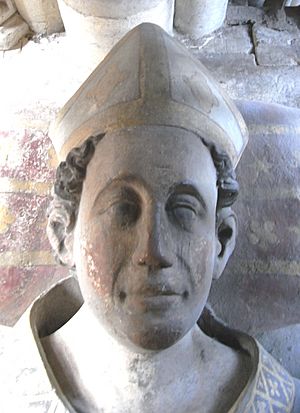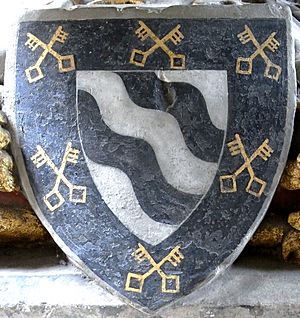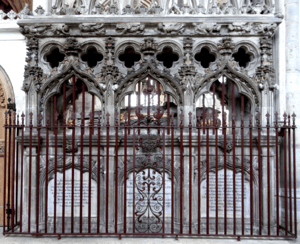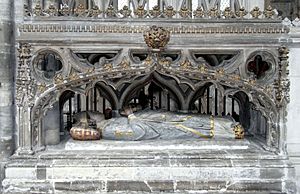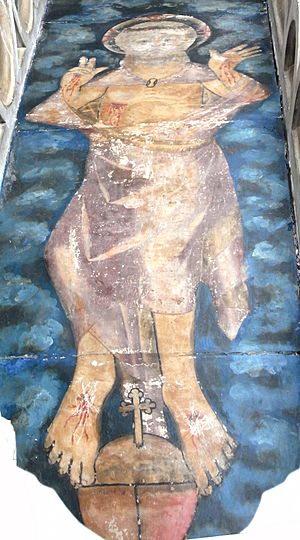Walter Stapledon facts for kids
Walter Stapledon (who died on October 15, 1326) was an important English church leader and government official. He served as the Bishop of Exeter starting in 1308. He was also the Lord High Treasurer of England twice, first in 1320 and then from 1322 to 1325.
Walter Stapledon helped start what is now Exeter College, Oxford, a famous university college. He also gave a lot of money to help rebuild Exeter Cathedral, where his tomb can still be seen today. Sadly, he was killed by a crowd during a difficult time in London.
Contents
Who Was Walter Stapledon?
Walter Stapledon was born on February 1, in or before the year 1265. His parents were William and Mabel Stapledon. They were a well-known family from Cookbury in Devon, England. His older brother, Richard Stapledon, was also an important judge and politician.
Walter Stapledon's Career and Achievements
Walter Stapledon studied at the University of Oxford. He earned a master's degree in 1286 and a doctorate in 1306. In 1300, he began working for Bishop Thomas Bitton in Exeter. He then became Bishop himself in 1308.
Working for the King
Besides his church duties, Walter Stapledon also worked for the King. He traveled to Aquitaine (part of France) and the Low Countries (like modern-day Belgium and Netherlands). He also helped with talks with Scotland. From 1313, he was a member of the Parliament of England. By 1315, he joined the King's special group of advisors, the Privy Council of England.
Serving as Treasurer
The country was facing many problems under King Edward II of England. In 1320, Walter Stapledon took on the challenging job of Lord High Treasurer. This meant he was in charge of the country's money. He resigned in 1321 because he disagreed with the King's decision to send away some powerful people called the Despensers.
He was asked to be Treasurer again in 1322. It was a tough job because the country was struggling with civil wars and expensive wars with Scotland and Aquitaine. It was hard to collect enough money.
Difficult Times and His Death
Walter Stapledon was involved in taking land from some people, including Queen Isabella of France. The Queen already disliked him, and now she saw him as an enemy. He was removed from his Treasurer job in 1325.
When Queen Isabella invaded England, Walter Stapledon went to London. The people of London were very angry with him and his brother. His house was looted and burned. Sadly, both he and his brother were killed in the street on October 15, 1326. His head was sent to the Queen.
His Legacy and Contributions
Walter Stapledon did many good things for the Catholic Church in western England and for the King. He also supported building projects, keeping important records, and learning. In 1314, he and his brother Richard founded Stapledon Hall at Oxford. This hall later became the famous Exeter College, Oxford.
Walter Stapledon's Monument
His monument is in the choir area of Exeter Cathedral, on the north side of the main altar. It is the most important monument from the 1300s in the cathedral. The monument shows the Bishop lying down in his robes. He holds a crozier (a bishop's staff) in his left hand and a book in his right.
The monument is made of a type of stone called Beer stone. On the ceiling inside the monument's canopy, there is a painting of Christ. This painting shows Christ displaying his Five Holy Wounds. This painting is hidden from view unless you look closely. An inscription by John Hooker was added in 1568 but was later removed.
 | Selma Burke |
 | Pauline Powell Burns |
 | Frederick J. Brown |
 | Robert Blackburn |


